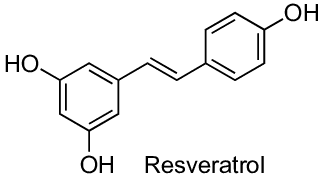What are the results of recent research on resveratrol and breast cancer?

This post summarizes the results of recent research on resveratrol and breast cancer. Resveratrol is a polyphenolic antioxidant present in peanuts, red grapes, apples, black olives, berries, and red wines. Commercial supplement may be extracted from an Asian plant called Polygonum cuspidatum. Resveratrol is a strong scavenger of free radicals and can also induce activities of numerous antioxidant enzymes. It also has antibacterial, antiviral, anti-inflammatory and anti-cancer activities. Much of the anti-cancer activities were the results of research using cultured cancer cells and laboratory animals. Clinical studies are still very limited.
Anti-cancer activities of resveratrol
Resveratrol exerts anti-cancer activities via multiple mechanisms. Its antioxidant property will protect cells from damage of DNA by free radicals and hence initiation of cancer development. It inhibits cancer growth by arresting cell division and promoting apoptosis (programmed cell death) of cancer cells. Moreover, it suppresses expression of pro-inflammatory factors to downregulate chronic inflammation which favors cancer growth and metastasis.
On the other hand, its inhibitory effects on cell migration, invasion and angiogenesis (growth of blood vessels) will inhibit cancer growth and spreading. It facilitates removal of carcinogen from the body. Furthermore, it also enhances anti-cancer immunity by inducing genes involved in immune response. This has positive effects on controlling growth of several tumor types, including those of skin, breast, prostate, lung, colon, and liver. Therefore, resveratrol is a good agent for cancer prevention and complementary therapy of cancer. However, poor aqueous solubility, rapid modification by conjugation, and weak bioavailability are great drawbacks for resveratrol. Nanotechnology may be able to increase bioavailability and to improve deliver of resveratrol to target cancer cells.
Interactions with cancer drugs
Since radiotherapy and chemotherapy of cancer utilize free radicals to kill cancer cell, antioxidants such as resveratrol will protect normal cells from collateral damage by these treatments. Resveratrol protects vital organs, such as heart, kidney, liver and intestine, from damage by many agents during chemotherapy. On the other hand, it acts as a sensitizer in chemotherapy and radiotherapy of many cancers, thus allowing the use of lower doses of anti-cancer drugs. It also increases efficacy of traditional chemotherapy by reducing drug resistance.
Resveratrol and breast cancer
Since resveratrol is a phytoestrogen (having a similar chemical structure with female sex hormone estrogen), it raises concern that resveratrol may stimulate growth of estrogen-dependent breast cancer cells. However, studies show that resveratrol is able to suppress the initiation, promotion and progression of breast cancer cells. In fact, grape consumption is inversely related to breast cancer. Resveratrol suppresses estrogen production by inhibiting aromatase expression and enzyme activity. In cultured cell studies, it suppresses growth of breast cancer cell lines by regulating a number of biological pathways. In animal studies, it delays tumor development by carcinogens, and reduces tumor growth and metastasis. However, the action of resveratrol on breast cancer cells depends on its concentration. At moderate concentration, resveratrol acts as an agonist. On the other hand, at low concentration, it acts as anti-estrogen. More animal studies are needed before clinical trials can be carried out.
For more information of resveratrol supplement, please go to this page.
References
- Xiao Q, Zhu W, Feng W, Lee SS, Leung AW, Shen J, Gao L, Xu C. A Review of Resveratrol as a Potent Chemoprotective and Synergistic Agent in Cancer Chemotherapy. Front Pharmacol. 9:1534, 2019.
- Gianchecchi E, Fierabracci A. Insights on the Effects of Resveratrol and Some of Its Derivatives in Cancer and Autoimmunity: A Molecule with a Dual Activity. Antioxidants (Basel). 9: E91, 2020.
- Vervandier-Fasseur D, Latruffe N. The Potential Use of Resveratrol for Cancer Prevention. Molecules 24: 4506, 2019.
- Berretta M, Bignucolo A, Di Francia R, Comello F, Facchini G, Ceccarelli M, Iaffaioli RV, Quagliariello V, Maurea N. Resveratrol in Cancer Patients: From Bench to Bedside. Int J Mol Sci. 21: 2945, 2020.
- Ferraz da Costa DC, Pereira Rangel L, Quarti J, Santos RA, Silva JL, Fialho E. Bioactive Compounds and Metabolites from Grapes and Red Wine in Breast Cancer Chemoprevention and Therapy. Molecules 25: 3531, 2020.